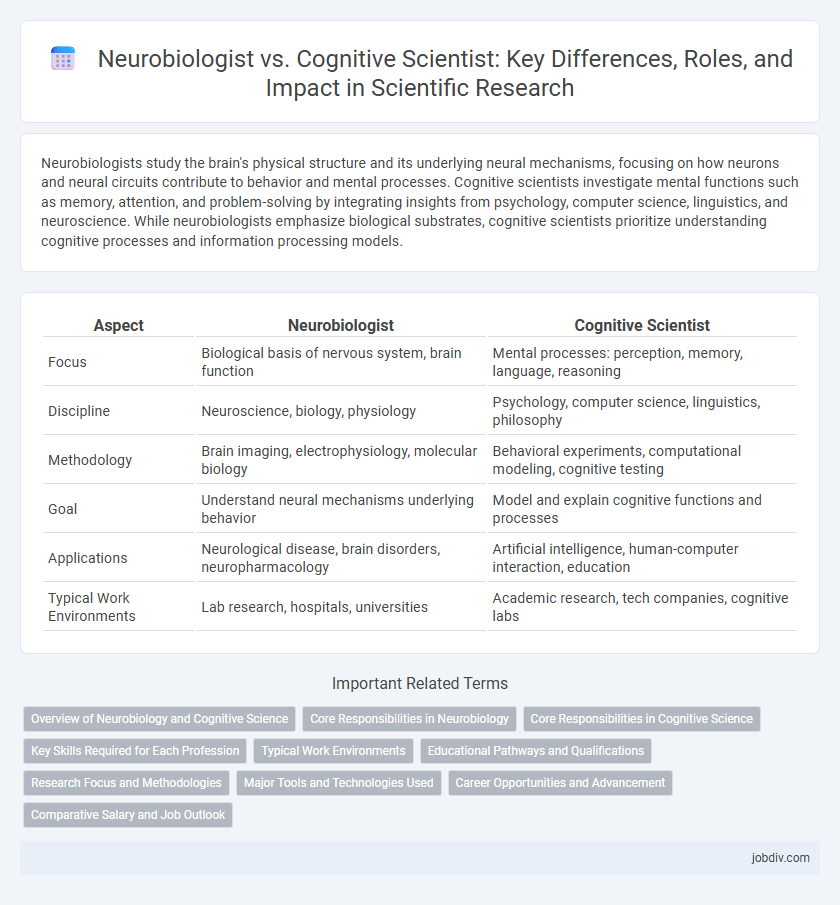Neurobiologists study the brain's physical structure and its underlying neural mechanisms, focusing on how neurons and neural circuits contribute to behavior and mental processes. Cognitive scientists investigate mental functions such as memory, attention, and problem-solving by integrating insights from psychology, computer science, linguistics, and neuroscience. While neurobiologists emphasize biological substrates, cognitive scientists prioritize understanding cognitive processes and information processing models.
Table of Comparison
| Aspect | Neurobiologist | Cognitive Scientist |
|---|---|---|
| Focus | Biological basis of nervous system, brain function | Mental processes: perception, memory, language, reasoning |
| Discipline | Neuroscience, biology, physiology | Psychology, computer science, linguistics, philosophy |
| Methodology | Brain imaging, electrophysiology, molecular biology | Behavioral experiments, computational modeling, cognitive testing |
| Goal | Understand neural mechanisms underlying behavior | Model and explain cognitive functions and processes |
| Applications | Neurological disease, brain disorders, neuropharmacology | Artificial intelligence, human-computer interaction, education |
| Typical Work Environments | Lab research, hospitals, universities | Academic research, tech companies, cognitive labs |
Overview of Neurobiology and Cognitive Science
Neurobiology examines the structure and function of the nervous system, emphasizing neural mechanisms underlying behavior and cognition. Cognitive science integrates psychology, neuroscience, linguistics, computer science, and philosophy to study mental processes such as perception, memory, and decision-making. Both fields contribute to understanding the brain-mind relationship but differ in methods and focus, with neurobiology centered on biological systems and cognitive science on computational and behavioral models.
Core Responsibilities in Neurobiology
Neurobiologists primarily investigate the structure and function of the nervous system at cellular and molecular levels, employing techniques such as electrophysiology and neuroimaging to understand neural pathways. They focus on studying brain anatomy, neural communication, synaptic plasticity, and neurodevelopmental processes to uncover mechanisms underlying behavior and neurological disorders. Experimental design and data analysis in laboratory settings are core responsibilities, aiming to translate findings into therapeutic strategies for conditions like Alzheimer's or Parkinson's disease.
Core Responsibilities in Cognitive Science
Cognitive scientists analyze mental processes such as perception, memory, and decision-making by integrating insights from psychology, artificial intelligence, linguistics, and neuroscience. They design experiments, develop computational models, and study cognitive functions to understand how the brain processes information. Their core responsibilities include investigating cognitive mechanisms, interpreting behavioral data, and applying findings to improve learning, language comprehension, and human-computer interaction.
Key Skills Required for Each Profession
Neurobiologists require advanced skills in molecular biology, electrophysiology, and neuroanatomy to investigate the cellular and molecular mechanisms of nervous system function. Cognitive scientists specialize in computational modeling, experimental psychology, and linguistics to analyze mental processes such as perception, memory, and decision-making. Both professions benefit from strong analytical skills and proficiency in data analysis tools, but neurobiologists emphasize laboratory techniques while cognitive scientists focus on interdisciplinary approaches integrating technology and theory.
Typical Work Environments
Neurobiologists typically conduct research in laboratory settings equipped with advanced imaging tools and electrophysiological equipment, often within universities or medical research institutes. Cognitive scientists work in interdisciplinary environments, including university departments, tech companies, and research labs, utilizing computational models, behavioral experiments, and cognitive testing tools. Both fields require access to specialized software and data analysis platforms to study brain function and cognition.
Educational Pathways and Qualifications
Neurobiologists typically pursue a Bachelor's degree in biology or neuroscience followed by a Ph.D. specializing in neurobiology or related fields, emphasizing laboratory research and neuroanatomy. Cognitive scientists often obtain interdisciplinary training through degrees in psychology, computer science, linguistics, or philosophy, culminating in advanced research degrees focused on cognition, perception, and artificial intelligence. Both fields require strong foundations in research methodologies, but neurobiology centers on biological mechanisms while cognitive science emphasizes mental processes and computational models.
Research Focus and Methodologies
Neurobiologists specialize in studying the structure, function, and chemistry of the nervous system using techniques such as electrophysiology, neuroimaging, and molecular biology to investigate cellular and neural processes. Cognitive scientists focus on understanding mental processes like perception, memory, and language through interdisciplinary approaches integrating experimental psychology, computational modeling, and behavioral experiments. Both fields contribute to unraveling brain-behavior relationships but differ in scale, with neurobiology emphasizing neural mechanisms and cognitive science emphasizing cognitive functions.
Major Tools and Technologies Used
Neurobiologists primarily use advanced imaging technologies such as fMRI, PET scans, and electrophysiological recording devices to study the brain's structure and neural activity at the cellular level. Cognitive scientists employ computational modeling, eye-tracking systems, and behavioral experiments to analyze mental processes like perception, memory, and decision-making. Both fields leverage neuroinformatics databases and machine learning algorithms to enhance data analysis and interpretation.
Career Opportunities and Advancement
Neurobiologists often find career opportunities in research institutions, pharmaceutical companies, and academic settings where their expertise in the nervous system drives advancements in neurology and drug development. Cognitive scientists typically pursue roles in artificial intelligence, human-computer interaction, and educational technology sectors, leveraging their understanding of mental processes to innovate in user experience and cognitive modeling. Career advancement in neurobiology frequently depends on publishing high-impact research and securing grants, whereas cognitive scientists progress by developing interdisciplinary projects that integrate psychology, neuroscience, and computer science.
Comparative Salary and Job Outlook
Neurobiologists typically earn salaries ranging from $70,000 to $120,000 annually, with growth in specialized research institutions and pharmaceuticals driving demand. Cognitive scientists have a broader application and average salaries between $65,000 and $110,000, with increasing opportunities in artificial intelligence and human-computer interaction fields. Job outlooks for both professions are positive, with neurobiology projected to grow 12% and cognitive science 14% over the next decade due to expanding research and technological integration.
Neurobiologist vs Cognitive Scientist Infographic

 jobdiv.com
jobdiv.com